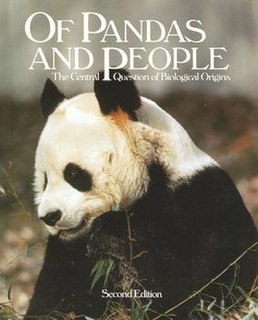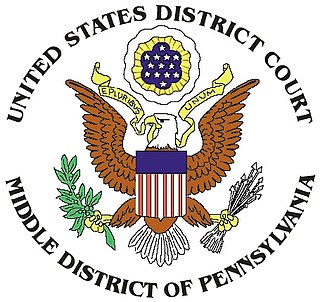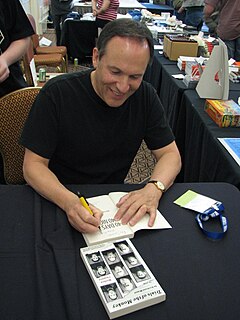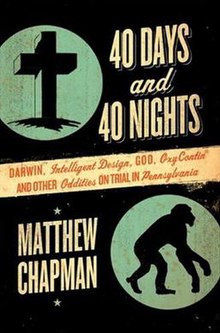
Intelligent design (ID) is a pseudoscientific argument for the existence of God, presented by its proponents as "an evidence-based scientific theory about life's origins". Proponents claim that "certain features of the universe and of living things are best explained by an intelligent cause, not an undirected process such as natural selection." ID is a form of creationism that lacks empirical support and offers no testable or tenable hypotheses, and is therefore not science. The leading proponents of ID are associated with the Discovery Institute, a Christian, politically conservative think tank based in the United States.

Dover is a borough in York County, Pennsylvania, United States. The population was 2,007 at the 2010 census.

Michael J. Behe is an American biochemist, author, and advocate of the pseudoscientific principle of intelligent design (ID). He serves as professor of biochemistry at Lehigh University in Pennsylvania and as a senior fellow of the Discovery Institute's Center for Science and Culture. Behe is best known as an advocate for the validity of the argument for irreducible complexity (IC), which claims that some biochemical structures are too complex to be explained by known evolutionary mechanisms and are therefore probably the result of intelligent design. Behe has testified in several court cases related to intelligent design, including the court case Kitzmiller v. Dover Area School District where his views were cited in the ruling that intelligent design is not science and is religious in nature.
Phillip E. Johnson was a UC Berkeley law professor, opponent of evolutionary science, co-founder of the pseudoscientific intelligent design movement, author of the "Wedge strategy" and co-founder of the Discovery Institute's Center for Science and Culture (CSC). He described himself as "in a sense the father of the intelligent design movement". He was a critic of Darwinism, which he described as "fully naturalistic evolution, involving chance mechanisms and natural selection". The wedge strategy aims to change public opinion and scientific consensus, and seeks to convince the scientific community to allow a role for theism, or causes beyond naturalistic explanation, in scientific discourse. Johnson argued that scientists accepted the theory of evolution "before it was rigorously tested, and thereafter used all their authority to convince the public that naturalistic processes are sufficient to produce a human from a bacterium, and a bacterium from a mix of chemicals."

The history of creationism relates to the history of thought based on the premise that the natural universe had a beginning, and came into being supernaturally. The term creationism in its broad sense covers a wide range of views and interpretations, and was not in common use before the late 19th century. Throughout recorded history, many people have viewed the universe as a created entity. Many ancient historical accounts from around the world refer to or imply a creation of the earth and universe. Although specific historical understandings of creationism have used varying degrees of empirical, spiritual and/or philosophical investigations, they are all based on the view that the universe was created. The Genesis creation narrative has provided a basic framework for Jewish and Christian epistemological understandings of how the universe came into being – through the divine intervention of the god, Yahweh. Historically, literal interpretations of this narrative were more dominant than allegorical ones.

The intelligent design movement is a neo-creationist religious campaign for broad social, academic and political change to promote and support the pseudoscientific idea of intelligent design (ID), which asserts that "certain features of the universe and of living things are best explained by an intelligent cause, not an undirected process such as natural selection." Its chief activities are a campaign to promote public awareness of this concept, the lobbying of policymakers to include its teaching in high school science classes, and legal action, either to defend such teaching or to remove barriers otherwise preventing it. The movement arose out of the creation science movement in the United States, and is driven by a small group of proponents.

Stephen C. Meyer is an American author and former educator. He is an advocate of intelligent design, a pseudoscientific creationist argument for the existence of God, presented with the claim that it is "an evidence-based scientific theory". He helped found the Center for Science and Culture (CSC) of the Discovery Institute (DI), which is the main organization behind the intelligent design movement. Before joining the DI, Meyer was a professor at Whitworth College. Meyer is a Senior Fellow of the DI and Director of the CSC.

Darwin's Black Box: The Biochemical Challenge to Evolution is a book by Michael J. Behe, a professor of biochemistry at Lehigh University in Pennsylvania and a senior fellow of the Discovery Institute's Center for Science and Culture. In the book Behe presents his notion of irreducible complexity and argues that its presence in many biochemical systems therefore indicates that they must be the result of intelligent design rather than evolutionary processes. In 1993, Behe had written a chapter on blood clotting in Of Pandas and People, presenting essentially the same arguments but without the name "irreducible complexity," which he later presented in very similar terms in a chapter in Darwin's Black Box. Behe later agreed that he had written both and agreed to the similarities when he defended intelligent design at the Kitzmiller v. Dover Area School District trial.

Of Pandas and People: The Central Question of Biological Origins is a controversial 1989 school-level textbook written by Percival Davis and Dean H. Kenyon, edited by Charles Thaxton and published by the Texas-based Foundation for Thought and Ethics (FTE). The textbook endorses the pseudoscientific concept of intelligent design – the argument that life shows evidence of being designed by an intelligent agent which is not named specifically in the book, although proponents understand that it refers to the Christian God. The overview chapter was written by young Earth creationist Nancy Pearcey. They present various polemical arguments against the scientific theory of evolution. Before publication, early drafts used cognates of "creationist". After the Edwards v. Aguillard Supreme Court ruling that creationism is religion and not science, these were changed to refer to "intelligent design". The second edition published in 1993 included a contribution written by Michael Behe.

"Teach the Controversy" is a campaign, conducted by the Discovery Institute, to promote the pseudoscientific principle of intelligent design, a variant of traditional creationism, while attempting to discredit the teaching of evolution in United States public high school science courses. The campaign claims that fairness and equal time require educating students with a 'critical analysis of evolution' where "the full range of scientific views", evolution's "unresolved issues", and the "scientific weaknesses of evolutionary theory" will be presented and evaluated alongside intelligent design concepts like irreducible complexity presented as a scientific argument against evolution through oblique references to books by design proponents listed in the bibliography of the Institute-proposed "Critical Analysis of Evolution" lesson plans.

An intelligent designer, also referred to as an intelligent agent, is the hypothetical willed and self-aware entity that the intelligent design movement argues had some role in the origin and/or development of life. The term "intelligent cause" is also used, implying their teleological supposition of direction and purpose in features of the universe and of living things.

The watchmaker analogy or watchmaker argument is a teleological argument which states, by way of an analogy, that a design implies a designer, especially intelligent design an intelligent designer, i.e. a creator deity. The analogy has played a prominent role in natural theology and the "argument from design," where it was used to support arguments for the existence of God and for the intelligent design of the universe, in both Christianity and Deism.

John F. Haught is an American theologian. He is a Distinguished Research Professor at Georgetown University. He specializes in Roman Catholic systematic theology, with a particular interest in issues pertaining to physical cosmology, evolutionary biology, geology, and Christianity.

Kitzmiller v. Dover Area School District, 400 F. Supp. 2d 707 was the first direct challenge brought in the United States federal courts testing a public school district policy that required the teaching of intelligent design. In October 2004, the Dover Area School District of York County, Pennsylvania, changed its biology teaching curriculum to require that intelligent design be presented as an alternative to evolution theory, and that Of Pandas and People, a textbook advocating intelligent design, was to be used as a reference book. The prominence of this textbook during the trial was such that the case is sometimes referred to as the Dover Panda Trial, a name which recalls the popular name of the Scopes Monkey Trial in Tennessee, 80 years earlier. The plaintiffs successfully argued that intelligent design is a form of creationism, and that the school board policy violated the Establishment Clause of the First Amendment to the United States Constitution. The judge's decision sparked considerable response from both supporters and critics.

The creation–evolution controversy has a long history. In response to theories developed by scientists, some religious individuals and organizations questioned the legitimacy of scientific ideas that contradicted the literal interpretation of the creation account in Genesis. Interpretation of the Judeo-Christian Bible had long been the prerogative of an orthodox priesthood able to understand Latin who traditionally held that Genesis was not meant to be read literally and taught it as an allegory. With the advent of the printing press, the translation of the Bible into other languages, and wider literacy, sundry and more literal understandings of scripture flourished. This allowed some religious persons and groups to challenge scientists who supported evolution, such as biologists Thomas Henry Huxley and Ernst Haeckel.

Matthew H. D. Chapman is an English journalist, author, screenwriter, director and activist.

The Discovery Institute has conducted a series of related public relations campaigns which seek to promote intelligent design while attempting to discredit evolutionary biology, which the Institute terms "Darwinism." The Discovery Institute promotes the pseudoscientific intelligent design movement and is represented by Creative Response Concepts, a public relations firm.

This timeline of intelligent design outlines the major events in the development of intelligent design as presented and promoted by the intelligent design movement.
Lauri Lebo is a spokeswoman for the Pennsylvania State Education association, Secretary of the ACLU-Pennsylvania Board of Directors, author, former radio station co-owner and disc jockey, and reporter from York County, Pennsylvania. Lebo was the principal local reporter covering Kitzmiller v. Dover in 2004 and 2005, and was featured prominently in the Nova documentary Judgment Day: Intelligent Design on Trial both because of her coverage and because her father, Shiremanstown Mayor Dean Lebo, who co-owned Christian radio station WWII-AM, sided with the Dover school board in the controversy.

The Devil in Dover: An Insider's Story of Dogma v. Darwin in Small-Town America is a 2008 book by journalist Lauri Lebo about the Kitzmiller v. Dover Area School District intelligent design trial, through her own perspective as a local reporter on the trial as she confronted her own attitudes about organized religion and her father who was a fundamentalist Christian.












